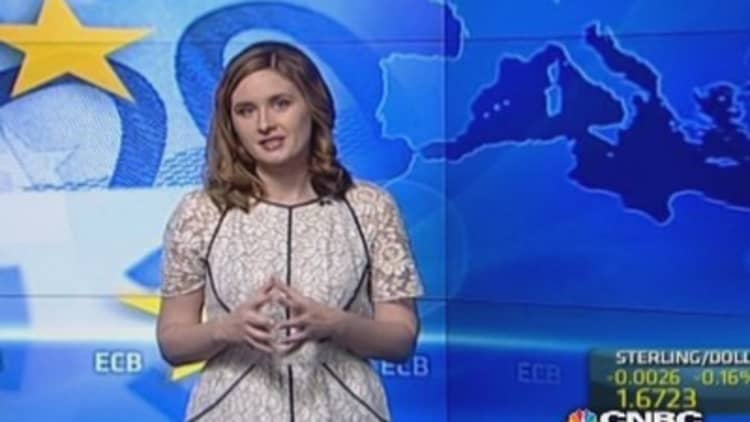
Pressure on the European Central Bank (ECB) to act this week increased on Tuesday, as euro zone inflation fell once again in April, boosting concerns of all-out growth-sapping deflation.
In the third of our series looking at ECB President Mario Draghi's options to stimulate growth, we examine liquidity-boosting measures.
What is it?
Long-term refinancing operations (LTROs) are ultra-cheap, long-term loans offered by the ECB to the euro zone's lenders, in the hope that these banks, flush with fresh, cheap cash, will boost lending to businesses and consumers.
Read MoreAll eyes on Draghi: Bond-buying bazooka on the way?
It would not be the first time the ECB has used this measure. At the height of the euro zone financial crisis in 2011, and during his first few months in the job, Draghi offered one set of three-year LTROs. He then backed this up with another set in February 2012. Banks borrowed more than 1 trillion euros ($1.36 trillion), and are now in the process of repaying the loans.

Any new LTRO is expected to target bank lending to businesses in particular – previously, banks had spent large chunks of the finance on sovereign debt. A targeted program could look similar to the Bank of England's Funding for Lending Scheme, which sees the central bank provide banks with funding, where its price and quantity is linked to their lending performance.
Another way the ECB could boost liquidity is by ending its efforts to offset its government bond purchases. Currently, the ECB "sterilizes" the money it spent buying sovereign bonds during the euro zone's debt crisis under the Securities Markets Program (SMP) - a move designed to avoid inflation or currency appreciation.
Why the ECB should do it
Lending is a sign of a buoyant economy and spurs spending, business investment and job creation. However, loans to small and medium sized businesses – the backbone of the euro zone economy -- continued to fall in April. In a further sign of tight liquidity, overnight bank-to-bank borrowing costs (EONIA or Euro OverNight Index Average) have also risen.
Read MoreAll eyes on the Draghi: Negative rate looms
An LTRO targeted at businesses would help stimulate lending and and prevent another credit crunch in the region.
The flood of new funding could also help reduce the high interest rates charged on corporate debt in the euro zone's shakier markets. Interest rates on short-term corporate lending are around 5 percent in Spain, compared to just 3 percent in Germany, according to Capital Economics.
Businesses are also battling with a strong euro, which makes exports more expensive, thereby hindering the region's efforts to grow. An LTRO that boosts the ECB's balance sheet could help weaken the currency.
Meanwhile, analysts estimate that ending sterilization could add around 175 billion euros ($240 billion) of liquidity to the euro zone's economy.
Why the ECB shouldn't do it
The impact of a targeted LTRO could be limited, as it has already been priced into the market, according to a number of analysts.
There is also the risk that the scheme's terms and conditions (targeting just small and medium-sized businesses, for example) and modest size could underwhelm. Market-watchers are expecting some large-scale unconventional measures from the ECB, and an LTRO alone could disappoint.
Read MoreEurope's SME crisis: Why Draghi's plans may not work
Plus, even if banks did offer more financing for businesses, there is nothing to say firms would take up the loans. Companies could still be reluctant to take on more debt given the widespread economic uncertainty.
What the experts think
Laurence Boone, economist at Bank of America Merrill Lynch, said he expects a new funding scheme to differ from previous LTROs by having a fixed rate, being conditional on lending, having a definite period of time and being limited in amount.
"This would be an announcement of liquidity, but the implemented liquidity injection would actually take weeks if not months to materialize given the conditionality," he said.
Read MoreECB shock? How to trade Draghi's moves
According to Deutsche Bank economists Mark Wall and Gilles Moec, the ECB is likely to pin its hopes on a targeted LTRO to impress the market. They said the market sees "silver bullet" capabilities in the policy – but that they remain unconvinced.
"The risk to the market is a narrower package of measures and/or terms and conditions on the targeted LTRO that disappoint or are too complex," they wrote in a note.


